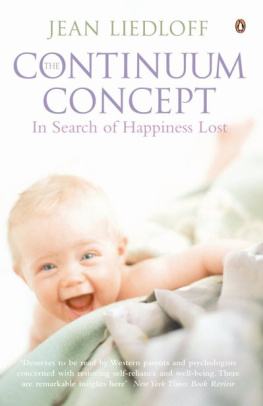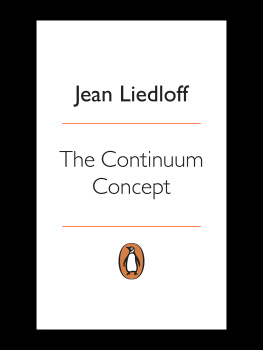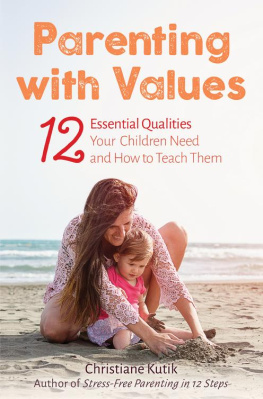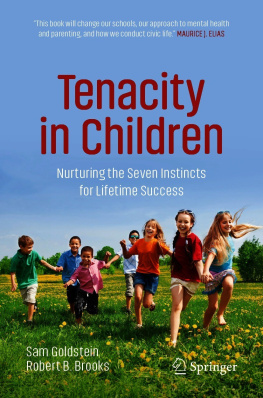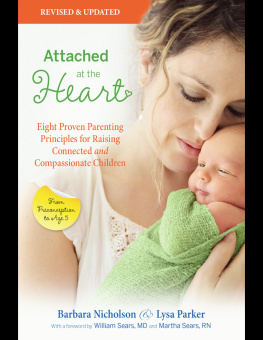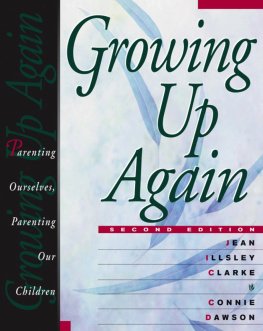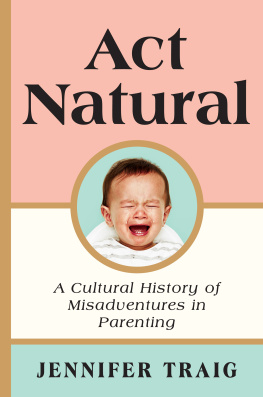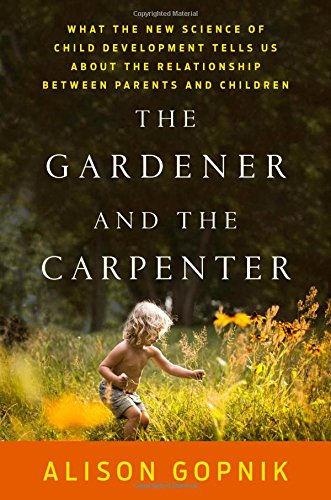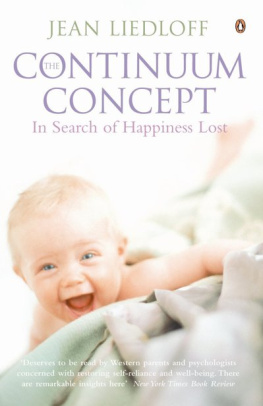PENGUIN BOOKS
THE CONTINUUM CONCEPT
Jean Liedloff was born and brought up in New York. She graduated from Drew Seminary for young women and went on to Cornell University, but began her travels without taking a degree. Attracted to Europe, then to the South American jungle, she made four expeditions among the Stone Age Indians of Venezuela before becoming convinced that we in Western civilization have tragically misunderstood our own nature. After a fifth expedition that confirmed her retrospective observations, she wrote The Continuum Concept.
Jean Liedloff has written for the Sunday Times and was a founding member of the Ecologist magazine. She now lectures and broadcasts around the world to students, doctors, parents, psychotherapists and a general public looking for explanations and remedies for personal alienation and social ills. Jean Liedloff lives in London where she practices and teaches psychotherapy based on the principles of The Continuum Concept. She is planning books on this work and on the rearing of children without conflict. The Continuum Concept has received great critical acclaim and has earned a substantial following in many countries.
The Sunday Telegraph said, It is really a thesis about achieving fulfilment. It is time we reappraised ourselves and discovered what sort of animal we are. We have a standard of living while the Yequana have a quality of life.
Dr Francis Ilg, author of Infant and Child and eminent pediatrician at the Gesell Institute in New Haven, Connecticut, said, It is a most remarkable book We have especially met resistance from parents. Something tells me they will listen to this.
Frankfurter Allgemaine called it inspiring and informative.
Psychologie Heute said it is The rare case of an optimistic radical book. It shakes the foundations of our conceptions without razing them to the ground, rather a catalyst than dynamite, with a lasting effect on everyday life, and selected it as one on The Years Best Books.
The Sunday Telegraph Magazine wrote, Miss Liedloff writes beautifully, never stooping to jargon, and her own personal involvement gives her story an immediacy that is most moving.
Jean Liedloff
The Continuum Concept

PENGUIN BOOKS
PENGUIN BOOKS
Published by the Penguin Group
Penguin Books Ltd, 80 Strand, London WC2R 0RL, England
Penguin Putnam Inc.. 375 Hudson Street. New York, New York 10014, USA
Penguin Books Australia Ltd, 250 Camberwell Road, Camberwell, Victoria 3124, Australia
Penguin Books Canada Ltd, 10 Alcorn Avenue, Toronto, Ontario, Canada M4V 3B2
Penguin Books India (P) Ltd, 11 Community Centre, Panchsheel Park, New Delhi 110 017, India
Penguin Books (NZ) Ltd, Cnr Rosedale and Airborne Roads, Albany, Auckland, New Zealand
Penguin Books (South Africa) (Pty) Ltd, 24 Sturdee Avenue, Rosebank 2196. South Africa
Penguin Books Ltd. Registered Offices: 80 Strand, London WC2R 0RL, England
www.penguin.com
First published by Duckworth 1975
Published in paperback by Futura 1976
Revised edition published in Penguin Books 1986
Published by Arkana 1989
Reissued in Penguin 2004
Copyright Jean Liedloff 1975.1986
All rights reserved
The moral right of the author has been asserted
Except in the United States of America, this book is sold subject to the condition that it shall not, by way of trade or otherwise, be lent,re-sold, hired out, or otherwise circulated without the publishers prior consent in any form of binding or cover other than that in which it is published and without a similar condition including this condition being imposed on the subsequent purchaser
ISBN: 978-0-14-196247-4
For Adam Yarmolinsky, Jonathan Miller, John Horder, Jonas Salk, Tarzie Vittachi and David Hearn who, when they understood the concept, took responsibility upon themselves for its furtherance, just as I had. And for Mouse and Janet with love.
Contents
Seeing first, understanding later, then going to confirm my observations / Arriving at the Continuum Concept
What a human being is evolved to expect from life / His inherent tendencies / How the continuum works, in the individual and in the culture
Natural birth and traumatic birth / The expectations and tendencies of the infant / The in-arms phase and its consequences in the rest of ones life / The experience of infants and babies within the continuum and without
What it means to be a social animal / The innate talent for self-preservation, the growth of self-reliance and the importance of respecting the childs responsibility for himself / The assumption of innate sociality and its implications / How a child educates himself / The kind of assistance required of his elders
The blind search for the missed experiences in every corner of life / The hard-drug addicts secret / Myths of the fall of man / The two steps away from the state of grace: mans evolved ability to make an intellectual choice and civilized mans derailment from the continuum / Relief from thinking, meditation, ritual and other thought-erasers
Cultures that suit and cultures that conflict with the continuum / Conformity, reliability, the right not to be bored / Whatever became of joy?
Sex and affection: distinguishing between the two needs for physical contact / As need continues, so does the possibility of fulfilment / Understanding and defining our needs from the continuum standpoint / Obstacles in our present way of life / The rights of babies / Approaches to reinstating the continuum in ways open to us / Applications of these principles to research
Some Reports and Thoughts for the Second Edition
On Parents
Three months before this book was first published in 1975, a friend asked me to lend my proof copy to a couple who were expecting their first baby. I met Millicent, the wife, later when she came to lunch with Seth, who was by then three months old. She told me that she and her doctor husband, Mark, were convinced that my ideas made sense because they corresponded to their own feelings. She was very keen that other parents read the book but was worried that some might be discouraged by the idea that they had to carry the baby about constantly for months.
I could see the point, she said, but I was sure I was not going to lug the equivalent of a ten- or fifteen-pound sack of potatoes around all day and night. Im afraid you might put people off altogether. Why dont you just stick to Put the shopping in the pram and carry the baby, as I heard you say on the radio? Most of them will probably be willing to do that, and when they get home theyll want to go on carrying it. I never did put Seth down because I didnt feel like it.
That was the idea, I said. Its only when the baby is there and your feelings for it are not negated that it works, not because someone said you should. Nor would you be likely to want to be stuck in the service of just a baby to that extent before you had met and fallen in love with it.
I solved the problem of my bath by taking Seth in with me and bathing him at the same time, she went on. If Mark gets home in time, he cant resist jumping in too. He loves sleeping with Seth as much as I do.
Ive found ways to do all my housework and gardening without putting Seth down. I put him down only when Im making a bed and bounce him around among the sheets and blankets, and he loves that. And I do wait until Mark can help me bring the coal up from the basement. The only time Seth and I are separated is when Im riding my horse. A friend holds him then. But Im always eager to take him back at the end of the ride. It feels right to have him with me. Luckily, I have a printing business with a friend, so I didnt have to give up my job. I work standing up, and by now Im used to having him in a sling on my back or hip. I can swing him around to the front if he wants to feed. He doesnt have to cry; he just grunts and reaches. At night too he only has to nuzzle about and I know hes hungry. I just plug in a bosom and dont even really have to wake up.

